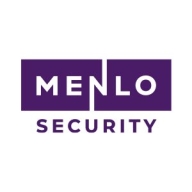


Menlo Secure and Fortinet FortiGate-VM are two significant players in the cybersecurity market. Fortinet FortiGate-VM seems to have the upper hand due to its robust set of features, indicating better overall user satisfaction despite higher pricing.
Features: Menlo Secure is praised for its straightforward deployment, effective threat isolation, and reliable web protection. Fortinet FortiGate-VM is noted for its comprehensive security features, including advanced threat protection, extensive configuration options, and superior capabilities.
Room for Improvement: Users of Menlo Secure suggest enhancing integration with various security tools, improving its reporting features, and adding more user-friendly management tools. For Fortinet FortiGate-VM, feedback points to a need for more intuitive management tools, better documentation, and simplified initial configuration.
Ease of Deployment and Customer Service: Menlo Secure is recognized for its easy and quick deployment, minimal complexity, and effective customer support. Fortinet FortiGate-VM, although recognized for its powerful features, has a steeper learning curve and requires more substantial initial configuration, though its customer service is well-regarded.
Pricing and ROI: Menlo Secure is viewed as cost-effective with reasonable setup costs and decent return on investment. Fortinet FortiGate-VM, while having higher initial costs, is considered worth the investment due to its extensive features and long-term benefits.
| Product | Market Share (%) |
|---|---|
| Fortinet FortiGate | 20.4% |
| Fortinet FortiGate-VM | 1.9% |
| Menlo Secure | 0.1% |
| Other | 77.6% |



| Company Size | Count |
|---|---|
| Small Business | 351 |
| Midsize Enterprise | 130 |
| Large Enterprise | 187 |
| Company Size | Count |
|---|---|
| Small Business | 69 |
| Midsize Enterprise | 31 |
| Large Enterprise | 34 |
Fortinet FortiGate excels in providing integrated VPN, firewalling, and Unified Threat Management (UTM) with centralized management and high availability. It supports remote access and comprehensive threat protection, making it a preferred choice for securing networks.
Fortinet FortiGate offers a robust security platform with features such as strong intrusion prevention, application control, and web filtering. Its integration with Active Directory and SD-WAN functionality provides scalable solutions for large networks. Users appreciate its ease of use through centralized management interfaces, ensuring robust security with flexible configurations. However, FortiGate could enhance its graphical interface and technical support responsiveness, address firmware bugs and costly licensing, improve logging, integrate better with third-party tools, and strengthen scalability and memory for log storage. Complexity in configuration and the need for intuitive features are noted challenges, and there's a demand for advanced security, zero-trust capabilities, and AI integration.
What are the key features of Fortinet FortiGate?Fortinet FortiGate is widely implemented across industries like education, finance, and government. Companies use it for firewall protection, VPN, and SD-WAN capabilities, ensuring secure perimeter and data center security. It facilitates remote access management and traffic routing optimization, offering reliable security and connectivity solutions.
FortiGate Virtual Appliances allow you to mitigate blind spots by implementing critical security controls within your virtual infrastructure. They also allow you to rapidly provision security infrastructure whenever and wherever it is needed. FortiGate virtual appliances feature all of the security and networking services common to traditional hardware-based FortiGate appliances. With the addition of virtual appliances from Fortinet, you can deploy a mix of hardware and virtual appliances, operating together and managed from a common centralized management platform.
Menlo Security Secure Application Access
Menlo Security Secure Application Access makes zero trust access easy, giving users secure connectivity to private applications, including web and legacy applications. At the core of Secure Application Access is the Menlo Secure Cloud Browser, which fetches, secures and delivers the content for users.
In addition to providing simple-to-deploy, clientless ZTA, Secure Application Access and the Menlo Secure Cloud Browser protect applications from attacks such as session hijacking, cookie manipulation, and other tactics that employ protocol manipulation.
Secure Application Access protects applications from Internet threats and provides granular controls for added protection of the application and associated data. These security controls include Read-only/Read-write, Upload/download, Copy/paste, AV scanning, Sandboxing, and Data Loss Prevention.
Last Mile Data Protection
Menlo Last-Mile Data Protection identifies and prevents sensitive data from leaving your company by meticulously inspecting all file uploads and user input across browsing sessions. Leveraging the Secure Cloud Browser, users are protected from the internet and you can protect your organization from data loss with comprehensive traffic monitoring and controls. This approach addresses the growing concerns surrounding data leakage in the age of AI tools like ChatGPT.
By identifying sensitive data through file types, regular expressions, or predefined libraries, Menlo Last-Mile Data Protection empowers security teams to regulate data input into AI platforms and prevent unauthorized uploads. This capability provides crucial protection for intellectual property, PII, and other confidential information.
The solution leverages the Menlo Cloud Security Platform's visibility and control over traffic to reliably detect and prevent data leaks originating from both browser submission forms and non-browser traffic. With the ability to inspect encrypted web traffic, Menlo Last-Mile Data Protection enforces DLP policies consistently across all users and devices, ensuring comprehensive data protection.
We monitor all Firewalls reviews to prevent fraudulent reviews and keep review quality high. We do not post reviews by company employees or direct competitors. We validate each review for authenticity via cross-reference with LinkedIn, and personal follow-up with the reviewer when necessary.